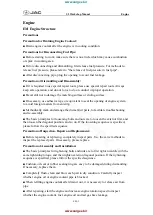
Do Not Decrease OR Increase The Front Passenger’s Seated Weight On The Front
Passenger Seat
The front passenger’s seated weight must be properly positioned on the front passenger
seat. Failure to do so may result in serious injury or death. The OCS determines the most
probable classification of the occupant that it detects. The OCS will detect the front
passenger’s decreased or increased seated weight, which may result in deactivation or
activation of the Passenger Advanced Front Air Bag in a collision. This does not mean that
the OCS is working improperly. Decreasing the front passenger’s seated weight on the
front passenger seat may result in deactivation of the Passenger Advanced Front Air Bag
causing serious injury or death. Increasing the front passenger’s seated weight on the front
passenger seat may result in activation of the Passenger Advanced Front Air Bag.
Examples of improper front passenger seating include:
• The front passenger’s weight is transferred to another part of the vehicle (like the door,
arm rest or instrument panel).
• The front passenger leans forward, sideways, or turns to face the rear of the vehicle.
• The front passenger’s seatback is not in the full upright position.
• The front passenger carries or holds an object while seated (e.g., backpack, box, etc.).
• Objects are lodged under the front passenger seat.
• Objects are lodged between the front passenger seat and center console.
• Accessories that may change the seated weight on the front passenger seat are
attached to the front passenger seat.
• Anything that may decrease or increase the front passenger’s seated weight.
G E T T I N G S T A R T E D
29
Summary of Contents for Viper2017
Page 197: ...NOTES 195...
Page 198: ...NOTES 196...
Page 199: ...NOTES 197...
Page 200: ...NOTES 198...
Page 201: ...NOTES 199...
Page 202: ...NOTES 200...
















































